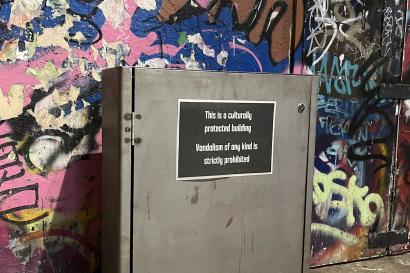Hallo zusammen aus chilly Berlin!
Apologies for the delay in posting the next installment of my blog adventure, but the past few weeks have been incredibly busy. I have plenty to update you on—from running around various S-Bahn stations to frolicking about the opera. Let’s get started before I wear myself out just introducing my latest adventures.
In a moment of creative decision (a welcome change, I must confess), I have opted to spare you the details of my travel. Suffice it to say, I arrived in Germany on a rather dull, grey afternoon—which, in hindsight, set the tone for the next two weeks, with some rain interspersed here and there for variety. I am currently staying at a very trendy hotel/hostel hybrid, complete with a gym, a restaurant/bar/café combination, and various study rooms. I find it quite agreeable, save for the occasional fire drill. The detectors are overly sensitive, or so the staff have informed us. We also have a communal kitchen. I find cooking difficult enough as it is, so doing so with an audience is hardly my idea of a fun night out. Most evenings, I prepare a delightful mix of pasta with ground turkey or chicken breast and pesto sauce. Germany’s economic collaboration with Italy via the EU does have its benefits—I can attest to that.
But now, let us come to the heart of the matter: CULTURE. I promised you a biweekly report of events, and I do not think the list I have conjured up will disappoint.
The Philharmonic
First order of business: the philharmonic. I attended a concert marking the 80th anniversary of the liberation of Auschwitz, performed by the Berlin Radio Symphony Orchestra. The repertoire included the world premiere of a contemporary work (which almost never bodes well for the audience’s ears) followed by a three-piece symphony by a Jewish composer. I had an excellent seat—first row of Section B RECHTS, which the more classically inclined among you will recognize as the equivalent of the Grand Tier.
But Isabella, I hear you ask, such tickets must have been expensive! A front-row seat overlooking the orchestra—however did you manage it? Fret not, readers. My ticket cost all of ten euros, thanks to a program called Classic Card, which grants people under 30 reduced-price tickets to all manner of concerts, ballets, and operas. I have a yearly subscription (€21 per year, as I am 21 years of age) and plan to soak up all the culture I can. I highly recommend it to anyone intrigued enough by Tár to see whether the Berlin Philharmonic Orchestra is truly the best in the world. After Marin Alsop’s guest conducting performance, which I plan to attend in a week or so, I shall return with my verdict.
An Olfactory Reading of William Burroughs
For those of you with a taste for the unconventional, my second cultural excursion may be of interest. I was cordially invited by a friend to an olfactory reading of William Burroughs’ poetry. If you don’t know what an olfactory reading is, rest assured, there is a good reason for that.
At 8 PM on an otherwise unremarkable Saturday, I found myself at an experience truly unlike any other. Thirty unsuspecting literary enthusiasts were crammed into a tiny art studio, with about ten more chairs than necessary (perhaps an unexpected artistic choice?). The instrumentation: a trumpet in Bb, a microphone with aggressively strong reverb effects, a man with a mustache stationed before a 2017 MacBook Pro, and a synth keyboard eerily reminiscent of Mr. Bean’s Chariots of Fire performance at the 2012 London Olympics.
In due course, we were treated to a deeply unsettling rendition of Burroughs’ poetry, alas, utterly incomprehensible to me. Below, I have transcribed some notes from the performance, which may offer insight into the madness:
BEFORE
- Incense bar blowtorched in an angular pestle by a man with a buzz cut so thin it could bring a USMC recruiter to tears.
- Three twenty-four-hour candles burning on stage—almost certainly a fire hazard.
- Pink, blue, and purple lights employed much too liberally, seemingly to evoke whimsy in the audience.
- Compilation of poems taped to the wall, impossible to read unless one’s head is turned 90 degrees—an act difficult to execute without resembling a parrot.
DURING
- I am being fanned with incense. One of the candles is in danger of being extinguished. The air smells like a mix of mothballs and attic.
- The room is now standing-room only—a remarkable indictment of Berlin’s beatnik scene.
- The reader jives his head to the beat despite the lack of any percussive instrument.
- Amendment: the trumpeter is now slamming his foot on the ground at approximately 120 bpm in 4/4 time for percussive effect.
- I doubt it will be long before someone abandons their literary and aesthetic principles for a hand-rolled American Spirit cigarette (terribly uncouth and predictably American, it should be noted).
- The incense now reminds me of Eau de Notre-Dame, the signature scent of the Parisian Archdiocese—exceedingly exclusive, to be found only in enormous late-Gothic cathedrals.
- Burroughs’ writing proves decidedly ill-suited to synth-organ arpeggios and trumpet improvisation.
- A description of disemboweled horses is not improved by a brief foray into the Johnny Cash discography.
- A young man watches from outside. He is smoking a cigarette.
- Laundry will no longer suffice to rid my clothes of the lingering scent of sour pine. I briefly consider the possibility of traversing the city naked at a temperature of 36°F.
- After six repetitions of “Nothing is permanent, everything is true” with six different vocal intonations, we give them a standing ovation lasting three minutes.
Two Operas in Two Days
My third cultural foray: two operas in two days. This, I must confess, was a booking error on my part. Attending the opera once a month would be sufficient for any normal person, but twice within 24 hours would be enough to drive any enthusiast (myself included) to near insanity. The first production: Rusalka, a Czech opera composed by Antonín Dvořák. Despite its long running length, I thought it presented interesting themes regarding love, social morays, and humanity. This was a modern adaptation, however, and it was rather unseemly, I thought, to dress the water sprite in a double denim ensemble complete with black Adidas sambas. Despite this interpretive choice, I was otherwise very impressed with the quality of singing, orchestration, and, much to my surprise, the audience.
For both of my operatic adventures, the audience figured as a source of curiosity and inspiration for me. The age of attendants was diverse, from teenagers younger than I was to couples older than my parents. In terms of linguistics, I recall hearing conversations in French, Spanish, Czech, Russian, Mandarin Chinese, and, perhaps most interestingly of all, English with a heavy Scottish brogue. People here are quite enthusiastic clappers: the standing ovation lasted around five minutes, which is enough to turn my hands raw from all of the adoration. The encores truly seemed never ending.
This presents a stark contrast to the United States. Ballet, opera and classical music remain inaccessible to many people, including students, people from low income backgrounds, or those who lack a performance venue near their home. I never would have been able to attend so many performances had I been back in Boston for the semester. Germany’s incentivizing of young people to visit these performance spaces has paid off, as far as I can see.

Isabella Ketchen
I'm Isabella, an undergrad from San Francisco studying abroad in Berlin this Spring. I'm a huge fan of film and the performing arts, so stay tuned for a review of the Berliner Philharmonie, Deutsche Oper Berlin, and Volksbühne Berlin.





